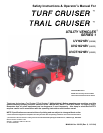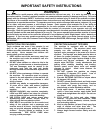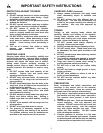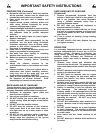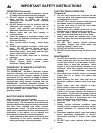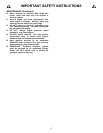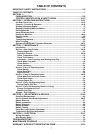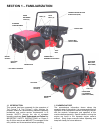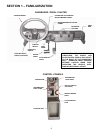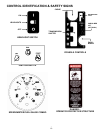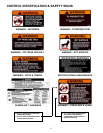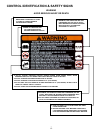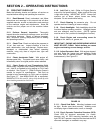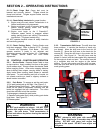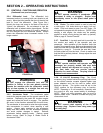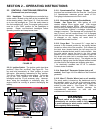
5
IMPORTANT SAFETY INSTRUCTIONS
OPERATION (Continued)
10. DO NOT operate machine at speeds in excess
of 10 MPH with the differential lock engaged.
11. DO NOT attempt to engage differential lock
while machine or wheels are moving.
Completely stop machine, before engaging
differential lock.
12. DO NOT attempt to turn the machine with the
differential lock engaged. To avoid loss of
control, slow machine and disengage the
differential lock before turning.
13. Reduce speed and use extra caution in
unfamiliar areas.
14. Avoid low hanging or protruding objects that
may strike the operator, passenger or Operator
Protective Structure.
15. Slow machine before turning. Avoid sharp
turns.
16. DO NOT park machine on slopes. Avoid uphill
starts. DO NOT abruptly change speed or
direction on slopes. Avoid turns when
descending slopes. Slow down and use extra
caution when turning on slopes.
17. Watch out for traffic when near or crossing
roadways.
18. DO NOT operate engine in enclosed areas.
Engine exhaust gases contain carbon
monoxide, a deadly poison.
POWERLINK
TM
BY BRIGGS & STRATTON
(Not featured on all models)
The POWERLINK
TM
On-Board Generator System
produces electricity that could result in death,
serious injury and/or property damage if proper
precautions are not followed. A Briggs & Stratton
Operating and Safety Instruction manual has been
provided with utility vehicles equipped with the
POWERLINK
TM
On-Board Generator System. To
avoid serious injury or death, read, understand and
follow all warnings and instructions in the manual,
on the machine and engine before using the
generator system.
ELECTRIC WINCH OPERATION
(Optional accessory on some models)
Every winching operation has the potential for
personal injury. The manufacturer of the winch has
provided detailed operating and safety instructions
that have been included with utility vehicles
equipped with a winch. To avoid serious injury or
death, read, understand and follow all warnings and
instructions in the manual, on the machine and
winch before performing a winching operation.
1. Read, understand and follow all warnings and
instructions in the winch operator’s manual
before performing a winching operation.
ELECTRIC WINCH OPERATION
(Continued)
2. The wire rope must be free of tension and the
wire rope drum fully stopped before engaging
or disengaging the clutch.
3. DO NOT use a recovery strap or other types of
stretchable straps in a winching operation.
4. Use the hook strap to hold the hook when
spooling wire rope in or out.
5. Always wear heavy leather gloves and do not
allow wire rope to slide through your hands.
6. DO NOT allow a helper to operate the winch
while you are handling the wire rope or hook.
7. Always keep hands and clothing clear of the
wire rope, spool and hook during operation and
when spooling.
8. DO NOT leave remove control (optional
accessory) plugged into winch while free
spooling, rigging, or not in use.
9. DO NOT use the winch as a hoist.
10. DO NOT tow the vehicle using the winch’s wire
rope.
MAINTENANCE
1. DO NOT store machine or fuel container inside
where fumes may reach an open flame, spark,
or pilot light such as in a water heater, furnace,
clothes dryer or other gas appliance. Allow
engine to cool before storing machine in an
enclosure. Store fuel container out of reach of
children in a well-ventilated, unoccupied
building.
2. Keep engine free of grass, leaves, and excess
grease and oil to reduce fire hazard and
overheating.
3. When draining fuel tank, drain fuel into an
approved container outdoors away from open
flame.
4. Check brakes each time machine is used;
adjust, repair or replace as needed.
5. Condition of tires and tire inflation pressure is
critical to the proper handling and braking of
the machine. Inspect tires and adjust pressure
before operating the machine. DO NOT operate
machine with worn or deteriorated tires. Use
only tires approved by manufacturer.
6. Keep all bolts, nuts, and screws properly
tightened.
7. Always provide adequate ventilation when
running engine. Engine exhaust gases contain
carbon monoxide, an odorless and deadly
poison.
8. Disconnect negative (black) cable from battery
before performing maintenance or service.
Unexpected cranking of engine could cause
injury.
9. DO NOT work under machine without safety
blocks.
5



